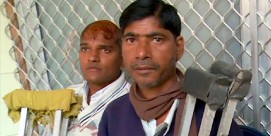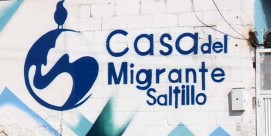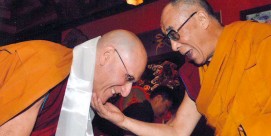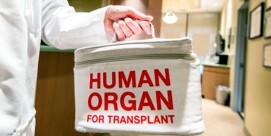In This Episode << SLIDE LEFT TO SEE ADDITIONAL SEGMENTS
Ethics of Health Care Rationing
BOB ABERNETHY, anchor: The Commonwealth Fund in New York this week released results of a new survey on the U.S. health care system. Eighty-two percent of Americans said the system should be fundamentally changed or completely rebuilt. But how to do it? One of the toughest questions in the national debate, an ethical question, is should health care be rationed? If so, which patients in need should be denied care?
We have a story today about doctors and medical students at a famous Texas hospital who are facing those questions and their painful answers. Lucky Severson reports.
LUCKY SEVERSON: Baptist pastor Kevin McBryde knew something was very wrong when he got such a debilitating headache he was bedridden for several days.
Pastor KEVIN MCBRYDE: I laid in the dark and I groaned and griped and finally my wife talked me into getting up and going to the hospital when my face went numb.
SEVERSON: Because he had a pre-existing condition, Hodgkin’s disease, when he was a teenager, the pastor was rejected by three health insurance companies. So he ended up here at UTMB, the University of Texas Medical Branch. Now, with no insurance and no money, he’s receiving very costly treatments at no charge for an aggressive form of lymphoma.
Dr. AVI MARKOWITZ (Chief of Oncology & Hematology, UTMB, speaking to Pastor McBryde): And it’s the five days of Prednisone, the one day of the Rituxin and chemotherapy, and then we will repeat that for three or four cycles.
SEVERSON: UTMB is legendary in Texas. It’s the oldest teaching hospital west of the Mississippi, a huge 795-bed complex centered in Galveston. The bulk of UTMB’s funding comes from Medicare, Medicaid, and the Texas legislature. The hospital attracts doctors and medical students for whom treating everyone, regardless of their ability to pay, is a solemn duty.

Dr. Kirk Smith |
Dr. KIRK SMITH (Founder, Frontera de Salud, UTMB): We take an oath. We actually stand up, raise our hands, and take an oath to be here for the health of all. Are we going to live up to that or not?
SEVERSON: If Doctor Smith seems upset, he’s not alone. UTMB finds itself in an untenable position. Because of dwindling funding and ever more patients who can’t pay, the hospital has been forced to ration health care. It’s a situation that has left doctors and students here deeply conflicted.
This was a meeting to debate the morality and justice of the latest rationing plan to deny treatment to cancer patients who are illegal or undocumented immigrants.
LAURA HERMER (Attorney, UTMB): We cannot ration, for example, based on someone’s race, someone’s ethnicity, someone’s gender, someone’s religion.
KATRINA LEONARD (Second Year Medical Student, UTMB, speaking at hearing): We are convinced that it is unjust and immoral to exclude a population of patients on the basis of their citizenship status.
Dr. JOHN STOBO (Former President, UTMB, speaking at hearing): It’s been a painful process and nobody has liked it. Many of the people who came to UTMB because of our mission were very upset when we had to do this.
SEVERSON: Dr. John Stobo is the former president of UTMB. He says like public hospitals nationwide, UTMB has been caught in a perfect storm.
Dr. STOBO: You had several things happening: an increase in the uninsured, decreasing in the rolls of people covered by federal and state programs, and closure of emergency rooms. So it became a real challenge to UTMB to take on the health care of an increasing number of people with the cost of health care continuing to increase.

Treating a patient |
SEVERSON: To reduce costs, the hospital system laid off almost 400 employees and curtailed some costly procedures altogether like cochlear ear implants, as well as some expensive high- tech drugs. Two years ago, the hospital simply ran out of funding for indigent care and was forced to turn patients away.
Dr. MARKOWITZ: That, in fact, was the worst thing that’s ever happened to me in my career.
SEVERSON: Dr Avi Markowitz is the chief of oncology and hematology at UTMB. He is convinced that denying cancer treatment to undocumented patients is the most ethical way, under the circumstances, to ration care.
Dr. MARKOWITZ: Shortly after I got here, because we had run out of money I was forced to close the medical oncology clinic to all unfunded patients for over four months, and that was a horrible situation to be put in. We can’t simply say we’ll go ahead without any forethought and treat until the money runs out and then close the doors. That, to me, that’s the least ethical way to take care of people with cancer.
SEVERSON: If James Halbert had come to UTMB when the hospital was forced to withhold care for patients without the means to pay, he might not have survived. Halbert has acute myeloid leukemia, and he lost his insurance when the mortgage company he worked for went broke. He says no one at UTMB has talked to him about money, and he’s grateful. But he wonders why such a rich country can’t take care of its own.
JAMES HALBERT (Patient, UTMB): When are you going to start taking care of the people of the United States and quit worrying about everybody else? You know, why aren’t we spending money on us?
SEVERSON: Of all the states, Texas has the highest percentage of residents without insurance — about one in four. Eighty percent of them are employed by small companies that don’t have to offer health insurance. It’s one of the reasons that students and doctors here are being forced to make painful human calculations.
Dr. Kirk Smith is the founder of Frontera de Salud, which offers free health care along the Mexican border. Volunteer students and doctors work out of a privately funded clinic, and when the patients can’t come to them, they go to the patients. Dr. Smith is extremely proud of Frontera’s work and bly opposed to limiting health care for undocumented patients.
Dr. SMITH: We’re taking a segment of the population, of the human community, and saying because you have this attribute, in this case you are undocumented, you don’t count.
SEVERSON: They are not even citizens.
Dr. SMITH: I’m a physician. I don’t look at citizens. I look at human beings.

Dr. Avi Markowitz |
Dr. MARKOWITZ: I have had that discussion with Dr. Smith, and I respectfully disagree with both his characterization and his conclusions. Personally, I don’t have a problem saying that it’s OK to turn away undocumented patients and treat U.S. citizens. I have said to Dr. Smith and to the students who take umbrage with that that that’s OK. If you want me to do that then you are going to have to come down and look at the 10 U.S. citizens or more who are gong to be denied access to care for each one of those undocumented patients that you treat.
SEVERSON: Dr. Markowitz says of the 190 patients he’s turned away in the last 18 months, about 14 percent — no more than 25 — have been undocumented. Even at that, he says, the savings in costly cancer treatments like chemotherapy can be substantial.
Dr. MARKOWITZ: We have patients who are often getting drug treatments that cost us — costs not charged by us — but cost us in excess of $30,000 a month. You don’t need too many of those patients to drain your entire resources program, and then you are turning away everybody else.
SEVERSON: Facing the hard reality of health care has come as a jolt to students like Katrina Leonard, a second year med student who came here full of idealism.
Ms. LEONARD: I look at the reasons why we were turning away the 14 percent, and if it’s something that’s unethical or unjust or immoral, then regardless of how many people that you are able to serve at the expense of that 14 percent, it shouldn’t be done.
Dr. SMITH: We’ve told them you’re unique, your profession stands aside because of this high moral relationship you stand in with regard to the patient, and then they get into the reality of practice and find its often profit-driven, or the willingness with which we deny some patients some access to care. And we have to lay this at the feet of the citizens. It’s a decision we’ve made as a society.
SEVERSON: Dr. Smith says he is not opposed to rationing. He simply wants a more equitable distribution.
Dr. SMITH: Before you put together whatever the rationing plan is, you make sure that you’re blinded to who that rationing plan is going to apply to. That’s how you can ensure that it’s going to be fair, unbiased, ethical. You make sure that, ahead of the game, you don’t know whether it’s going to apply to your worst enemy or your mother.
SEVERSON: He says that one problem is that patients want the best care money can buy — tests, for instance, they may not need like MRIs and CAT scans. Dr. Markowitz agrees that hospitals and doctors need to rethink the tradeoffs of prescribing expensive tests and drugs.
Dr. MARKOWITZ: We see patients referred to us with very advanced disease who, in fact, are likely to only live a few weeks or perhaps a few months, and it will be an enormous drain on the resources. And then you have to ask yourself, is it reasonable to do that when you know you’re not going to accomplish anything good, or take that same amount of money and be able to help a half of dozen women newly diagnosed with early stage breast cancer and offer them curative therapy?
SEVERSON: Pastor McBryde believes the compassionate care he has received at UTMB underscores one of Christianity’s greatest commandments: to love your neighbor as yourself. But he draws a line if the neighbor is undocumented.

Pastor Kevin McBryde |
Pastor MCBRYDE: They’re breaking the law when they come into this country. I don’t know. It’s just a big part of me that has a real problem with someone who breaks the law, knowingly breaks the law, and then demands privileges.
SEVERSON: Calculating the cost versus the benefit of patient care has taken a toll not only on patients but on the doctors who make the hard choices, none more than Dr. John Stobo.
Dr. STOBO: It’s time for this country to take this issue on, and seriously take it on. We’ve got a health care system which denies health care to 47 million Americans simply and solely because they don’t have health insurance and can’t afford to pay for the health care. So this is an abomination, and we as a country have got to say this is totally irresponsible. We’ve got to do something about it.
SEVERSON: Doing something about it, of course, means increased funding from the federal government and the Texas legislature, and that’s a challenge. President Bush has proposed budget cuts in both Medicaid and Medicare, and the Texas legislature has yet to fully reinstate $50 million that was cut from UTMB’s budget.
For RELIGION & ETHICS NEWSWEEKLY, I’m Lucky Severson in Galveston, Texas.







